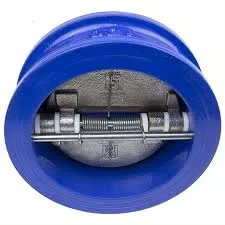
- Call Us
- +8618633052223
- njhdvlz@163.com
Th8 . 18, 2024 15:17 Back to list
Isolation Check Valve Manufacturing Process and Quality Assurance Methods Explained
The Importance of Isolation Check Valve Factories in Modern Industry
Isolation check valves are critical components in various industrial systems, playing a vital role in maintaining the integrity and efficiency of fluid and gas flow. As industries continue to expand and modernize, the demand for reliable and high-quality isolation check valves has surged, leading to the establishment of specialized factories dedicated to their manufacturing. This article explores the significance of isolation check valve factories, their production processes, and the impact they have on various sectors.
Understanding Isolation Check Valves
Isolation check valves are designed to prevent backflow in piping systems, ensuring that fluids only move in one direction. This is essential for protecting equipment, maintaining system pressure, and preventing contamination. These valves are widely used in diverse applications, including water treatment plants, oil and gas industries, chemical processing, and HVAC systems. The functionality of these valves is crucial, as any failure could lead to significant operational issues, environmental hazards, or safety risks.
The Role of Factories in Production
The manufacturing of isolation check valves involves a series of precise processes that require specialized knowledge and equipment. Isolation check valve factories are equipped with modern machinery that facilitates the transformation of raw materials into high-quality finished products. The production process typically includes
1. Material Selection The choice of materials is critical, as isolation check valves must withstand harsh operating conditions, such as high pressure, temperature fluctuations, and corrosive environments. Factories often work with materials like stainless steel, brass, and various alloys to ensure durability and reliability.
2. Machining and Fabrication Once the materials are selected, they undergo machining processes, including cutting, grinding, and drilling, to create the specific components of the valves. Advanced CNC (Computer Numerical Control) machines are commonly used to achieve high precision.
isolation check valve factories

3. Assembly After individual components are fabricated, they are assembled into complete valves. This step requires skilled technicians who ensure that each valve is assembled correctly to guarantee proper functionality.
4. Quality Control Rigorous quality control measures are implemented throughout the manufacturing process. Factories conduct various tests, such as pressure testing and flow testing, to ensure that each valve meets industry standards and customer specifications.
5. Certification and Compliance Compliance with international standards, such as ISO and API certifications, is essential for isolation check valve factories. These certifications not only ensure product quality but also enhance the factory’s reputation in the global market.
Impact on Industries
Isolation check valve factories play a pivotal role in multiple industries by ensuring a steady supply of reliable valves. The growth of sectors such as water treatment and energy production has significantly increased the demand for these valves. Moreover, as industries evolve towards more sustainable practices, the need for advanced valve technologies becomes even more pronounced.
Furthermore, the innovation in valve design and manufacturing is crucial in addressing the challenges posed by climate change and environmental regulations. Factories that invest in research and development are better positioned to create valves that are not only efficient but also environmentally friendly.
Conclusion
Isolation check valve factories are essential in the landscape of modern industry, providing critical components that ensure the safe and efficient operation of various systems. As the demand for reliable and sustainable engineering solutions grows, these factories will continue to play a significant role in supporting industries worldwide. Their commitment to quality, innovation, and compliance will ultimately contribute to safer, more efficient industrial operations, fostering a resilient economy for the future.
-
3 Butterfly Valve Dimensions | GPT-4 Turbo Precision Specs
NewsJul.31,2025
-
Stainless Steel Sanitary Butterfly Valve for Hygienic Flow Control
NewsJul.30,2025
-
High-Performance Groove Butterfly Valve for Easy Installation
NewsJul.30,2025
-
High-Quality 2 Inch Butterfly Valve for Precise Flow Control
NewsJul.29,2025
-
Double Flanged Short Pattern Butterfly Valve for Reliable Flow Control
NewsJul.29,2025
-
High Quality Wafer Check Valve Factories – Reliable Manufacturer & Supplier
NewsJul.29,2025